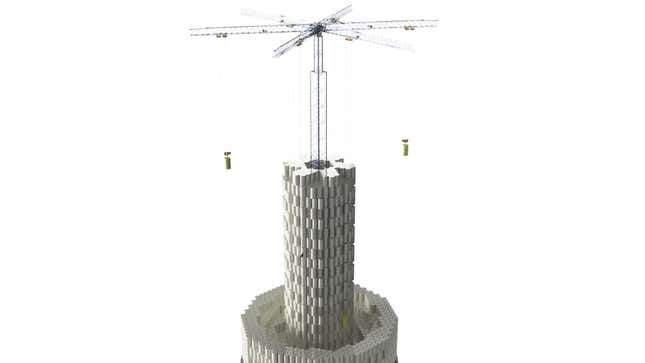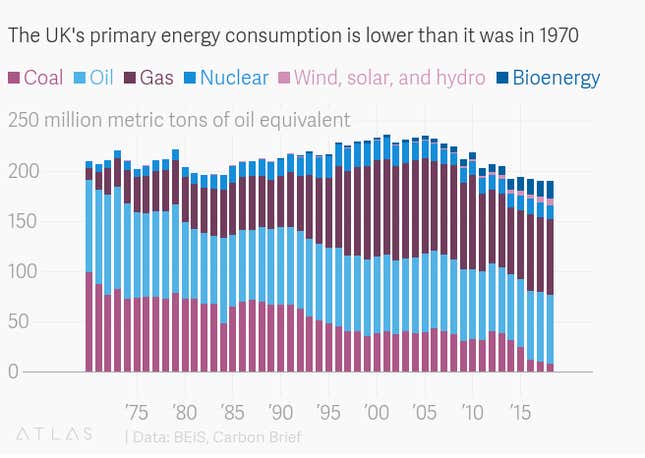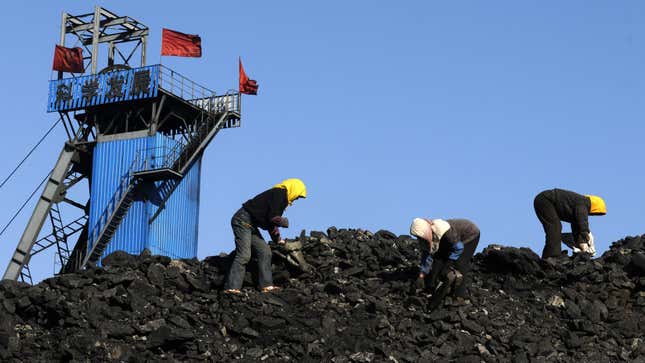The newsletter is back after a break. A brief recap: you can watch the Aug. 8 Atlantic Council panel discussion I was on in Washington DC. More than a dozen of us met in Chicago on Aug. 12 for an evening of buzzing conversations. Next, we’ll meet in New Delhi on Sep. 4. Please hit reply to let me know if you’d like to join.
Here’s what happened over the past week that helped or harmed the world’s chances to cut greenhouse-gas emissions to zero.

🔽 Decreases emissions
1️⃣ Last year, Quartz was the first to report on the Swiss startup Energy Vault, which stores energy using concrete blocks. The company is aiming to fill an important gap created by greater deployment of solar and wind power: long-duration storage of electricity. Soft Bank’s Vision Fund is now investing $110 million to help scale up the technology—its first sustainability investment.
2️⃣ Germans eat, on average, 60 kg of meat each year—second only to Americans. Now, the country’s two largest political parties want to increase the sales tax on meat and meat products from 7% to 19% in a bid to cut consumption and greenhouse-gas emissions. Related: Goldsmiths, University of London has banned all beef products saying, “Declaring a climate emergency cannot be empty words.”
3️⃣ After nearly two years of delay, Chevron launched the world’s largest project that buries carbon dioxide into saline aquifers underground. The emissions are captured from a natural-gas processing facility in Australia, and the injection is done because of government mandates. At 4 million metric tons buried each year, the project’s impact is nearly as much as the emissions avoided by all the rooftop solar panels installed in the country.
4️⃣ The practice of “slash and burn” is used to clear lands in Indonesian forests for palm-oil plantations. The method has created an environmental crisis, releasing huge amounts of greenhouse gases and particulate pollution. Now, the government is taking firm steps to end the practice. Note: palm oil is found in almost everything you can buy in any supermarket around the world, from pizza to lipstick.
5️⃣ Electric-vehicles round up: After China cut direct subsidies on electric cars, its sales figures have hit the brakes. Rickshaw pullers in India are going electric—improving their living conditions and not adding pollution to the streets. The world’s first all-electric ferry made its maiden voyage in Denmark.
Turning back time

The UK now consumes less overall energy than it did in 1970. At the same time, the country’s economy grew more than three times larger from 1965 to today, implying that the amount of energy required to produce each pound of economic output has fallen precipitously. The three main drivers: energy efficiency; transitioning to renewable energy; and moving from energy-intensive industries, such as cement and steel, to service-driven industries, such as finance and consulting.
0️⃣ Net-zero (for now)
1️⃣ The UN published a landmark report on land use and climate change, and—you guessed it—it’s not good news. Robinson Meyer at The Atlantic does a good job of explaining the significance of the report through a series of gut punches.
2️⃣ Scientists are getting better at connecting climate change to extreme weather events. Thanks to faster and cheaper computing power, scientists are able to attribute cause and effect better than ever before.
3️⃣ The UK’s longest blackout in a decade has boosted the case for batteries. On Aug. 16, in a rare coincidence, a natural-gas power plant and a wind farm both stopped producing power, cutting electricity off across parts of the country.
4️⃣ Fiji has set out legislation to hit net-zero emissions by 2050. The announcement came days before the Pacific Islands Forum met to discuss regional policies. The event ended with calls for reviewing Australia’s membership because it continues to support coal, even as rising sea levels threaten the very existence of other countries in the forum.
5️⃣ “After years of meetings and shareholder resolutions, some funds are starting to simply divest from coal and oil stocks,” says Bloomberg. Expect more such headlines.
The inevitable future of autonomous vehicles
My colleague Michael Coren is publishing a field guide this week on what he calls “the distant, but inevitable future” of autonomous vehicles. He looks at the state of the industry, creates a detailed timeline of the technology, talks to an entrepreneur who wants more government regulations, and worries over America’s transportation do-over. Quartz members will also be able to join a conference call with Michael at 11am ET on Aug. 22.

🔼 Increases emissions
1️⃣ Coal is dying? Not so fast. The market for seaborne coal is still growing. Domestic consumption in the largest coal-consuming country, China, is likely to go up too. Approvals for new coal mines have surged this year.
2️⃣ And there’s more coal news. The New York Times looks at how the billionaire Gautam Adani gamed the system in Australia, Bangladesh, and India to likely keep the three countries hooked on coal for decades to come.
3️⃣ Are you bored of coal news yet? India will be required to spend $10 billion meet air-pollution standards on coal power plants. This estimate comes four years after the standards were set and two years after the deadline to comply was missed.
4️⃣ As carbon dioxide levels increase, the world’s plants are expected to increase the productivity of photosynthesis in a process called “global greening.” Sadly, it turns out that as water becomes a scarcer resource, global greening might not happen as expected.
5️⃣ The shale gas boom may be doing more harm than previously thought. The use of natural gas instead of coal cuts greenhouse-gas emissions, but a new study finds that methane leaks from fracking may be undoing any climate good.
Stats to remember
As of Aug. 17, the concentration of carbon dioxide in the atmosphere was 410.06 ppm. A year ago, the level was 407.09 ppm.
If you’d like to support my work, you can subscribe to Quartz using the promo code AKSHAT8487 at checkout. You’ll get 50% off Quartz’s membership. Have a great week ahead. Please send tips to akshat@qz.com.